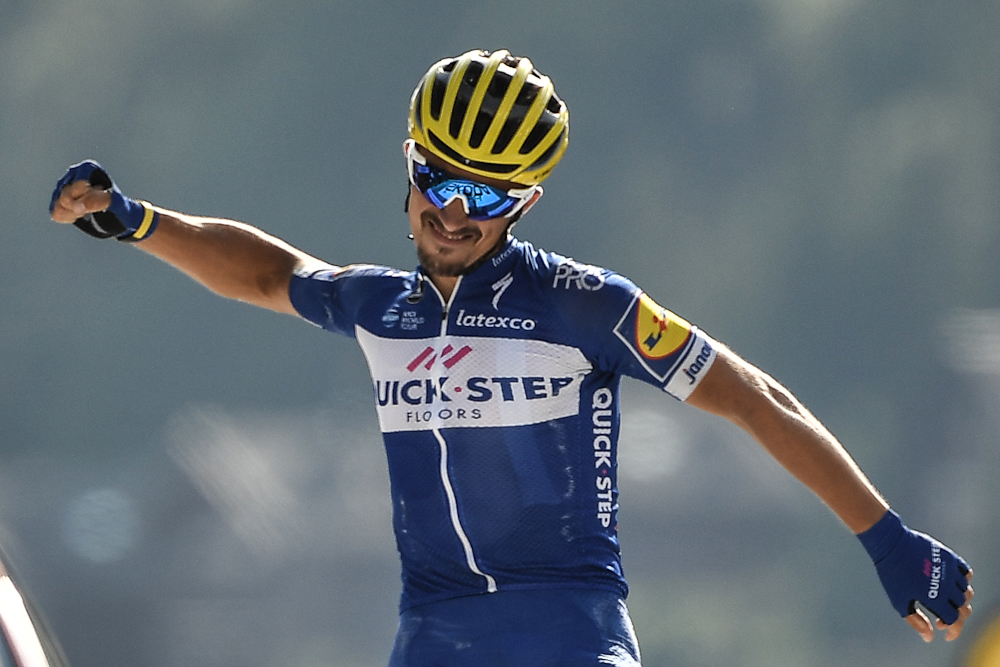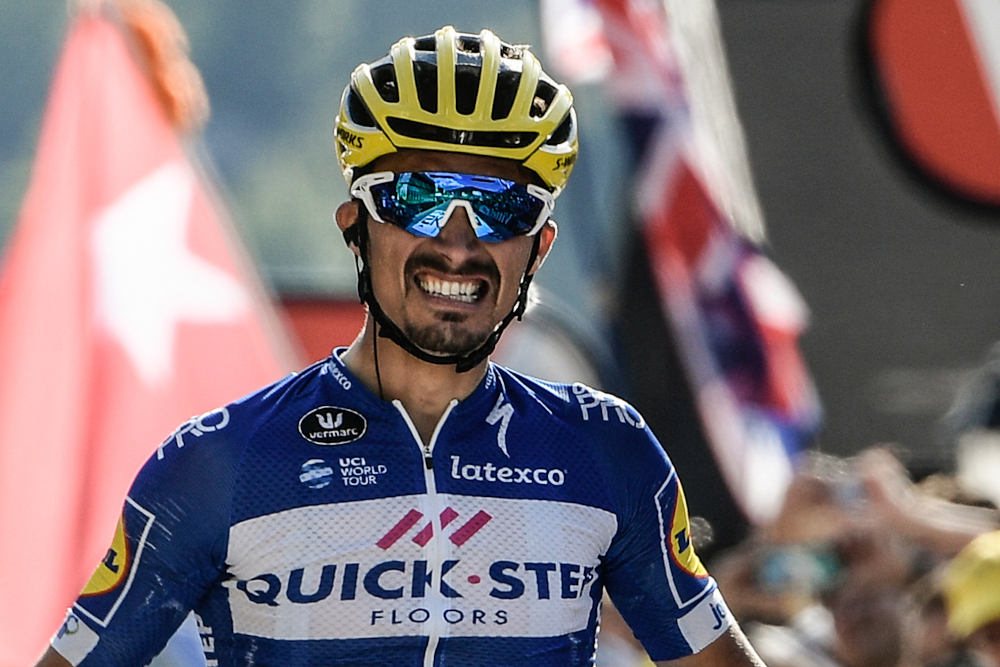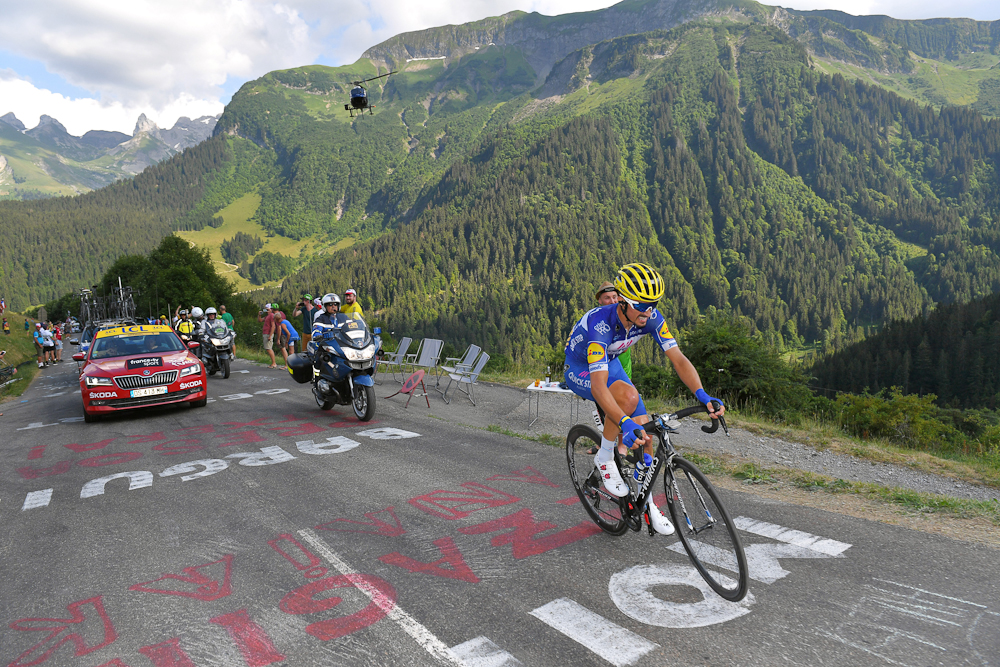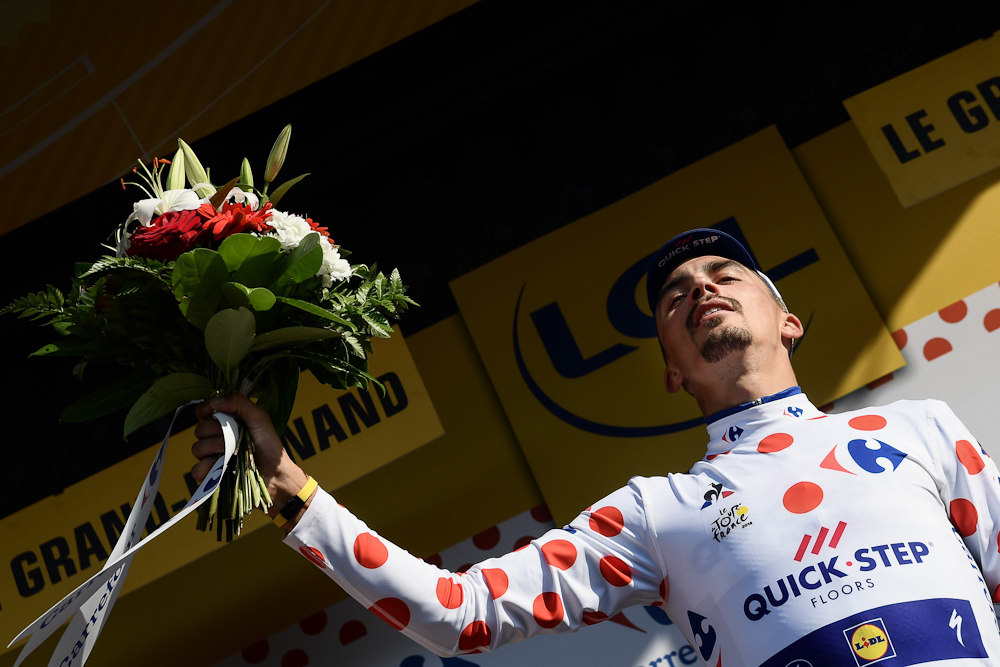Alaphilippe: I'm an impulsive rider but I've learned to control myself better
Frenchman solos to victory as the Tour de France enters the Alps





Tuesday was not the first time that Julian Alaphilippe signalled his intentions on the Plateau de Glières. In September 2013, a youthful Alaphilippe scored the finest victory of his amateur career atop the mountain at the Tour de l’Avenir, before graduating to the paid ranks with Quick-Step Floors the following season.
On stage 10 of the 2018 Tour de France, meanwhile, the Frenchman danced clear of the early break and led through the dirt and gravel road past the summit, a warning ahead of his winning attack in the finale. There were still some 90 kilometres of stage 10 remaining as the early escapees chased the plume of dust rising from Alaphilippe’s rear wheel on a mountainside renowned for its place in the history of the French Resistance, and many of their number must already have had a sense of how their afternoon would end.
Alaphilippe’s decisive move came on the stiff Col de Romme with a shade over 30 kilometres to go, when he bridged up to Rein Taaramae (Direct Energie) and then punched away from the Estonian at the summit. Although Taaramae briefly got back on terms over the other side, he was irretrievably distanced on the sinuous descent, and Alaphilippe stretched his buffer over the Col de la Colombière to win by 1:34 in Le Grand-Bornand.
“I only started to think I could win in the last kilometre of the Col de Romme when I saw the other riders in the group were in difficulty,” Alaphilippe said afterwards. “At the start of the day, it was hard to get into the break, but after that, it was about having the legs on the climbs.”
Alaphilippe was expected to shine earlier in this Tour, on the puncheurs’ finales at Quimper and Mûr-de-Bretagne, when he was also within striking distance of snaring the maillot jaune, but he admitted that he lacked the strength to deny Peter Sagan (Bora-Hansgrohe) and Dan Martin (UAE Team Emirates) on those occasions. In the Alps on Tuesday, however, he seized his moment.
“Personally, I was a bit disappointed with my first week in Brittany. There was a lot of expectation around me, but – frankly – I just didn’t have the legs in Quimper and Mûr-de-Bretagne,” Alaphilippe said. “But you have to bounce back and I knew I’d have other opportunities: I took one today. It’s special to win my first stage of a Tour and to do it in this manner, too.”
Character
Alaphilippe’s win at Glières on the Tour de l’Avenir five years ago was a showcase of what was to follow in his professional career. He married imagination and adventure in attacking on the preceding descent, and then demonstrated his strength in holding off chasers that included Adam Yates and Matej Mohoric on the climb to the finish. The lingering question, perhaps, was whether Alaphilippe’s independence of spirit would be overly constrained by life in the professional peloton.
The latest race content, interviews, features, reviews and expert buying guides, direct to your inbox!
“It’s true that I have a strong character, but I think it’s a good thing considering the job I have. But I’m calmer than before, I control myself more and thanks to that, I managed to step up this year. I think it’s a strength and an advantage to have this character and I’m happy to have this character,” said Alaphilippe, who prefixed every response in his post-race press conference with a polite ‘bonjour’ to the person he was addressing.
“Cycling, well, I live it fully. I love what I do. It’s a difficult job, one that requires a lot of sacrifices, and your lifestyle has to be almost perfect. In races, I’m someone who needs to attack and so the first week of the Tour was hard to manage. I was quite bored at times, at least until stage 6. I’m an impulsive rider, but I’ve learned to control myself better. I love the life, I love to work hard and suffer, but I’m calmer than before.”
Alaphillipe won plenty of admirers on his debut Tour in 2016, but no prizes, and near-misses had littered his career up until his Flèche Wallonne victory this spring. His resumé includes a crash-blighted fourth place at the Rio Olympics, narrow defeats to Alejandro Valverde (Movistar) in the Ardennes Classics, and a forceful but unsuccessful late attack at last year’s Worlds. Injury and illness had also interrupted his progress at various junctures.
“It’s clear that I’ve had a few frustrations in the last few years,” said Alaphilippe, who was in tears after the finish on Tuesday. “But those frustrations help you grow and make you stronger. But my emotions at the finish wasn’t about frustration, it was the pain. I really suffered to go looking for this win.”
As well taking the stage honours, Alaphilippe has moved into the polka dot jersey of king of the mountains. His natural aggression and his rapid sprint make him a firm candidate to carry the jersey to Paris, even if he downplayed the idea, just as he had earlier gently dismissed comparisons with Bernard Hinault and Laurent Jalabert.
And while Alaphilippe noted that his preparation for this year’s Tour had incorporated a more deliberate emphasis on longer mountain passes – “I reconnoitred this stage with Bob Jungels before the Tour” – he stressed that he had no intention of attempting to make a tilt for the general classification at a Grand Tour in the near future.
“It’s a good question, but at the moment it doesn’t form part of my plans,” Alaphilippe said. “I’m focused on the Classics and one-week races, but the general classification isn’t something I’m thinking about – for the moment in any case.”

Barry Ryan was Head of Features at Cyclingnews. He has covered professional cycling since 2010, reporting from the Tour de France, Giro d’Italia and events from Argentina to Japan. His writing has appeared in The Independent, Procycling and Cycling Plus. He is the author of The Ascent: Sean Kelly, Stephen Roche and the Rise of Irish Cycling’s Golden Generation, published by Gill Books.